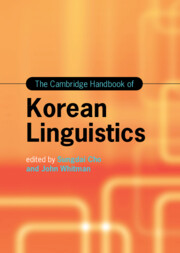Book contents
- The Cambridge Handbook of Korean Linguistics
- Cambridge Handbooks in Language and Linguistics
- The Cambridge Handbook of Korean Linguistics
- Copyright page
- Contents
- Figures
- Tables
- Contributors
- Preface
- Acknowledgments
- Abbreviations
- Part I Korean Overview
- Part II Phonetics and Phonology
- Part III Morphology and Syntax
- Chapter 12 Right-Dislocation in Korean: An Overview
- Chapter 13 Experimental Insights on the Grammar of Korean Anaphors
- Chapter 14 Person-Denoting Nominals: Interpretations and Structures
- Chapter 15 Lexical Nominalizations in Korean
- Chapter 16 The Processing of a Long-Distance Dependency in Korean: An Overview
- Part IV Semantics and Pragmatics
- Part V Sociolinguistics and Psycholinguistics
- Part VI Language Pedagogy
- Index
- References
Chapter 12 - Right-Dislocation in Korean: An Overview
from Part III - Morphology and Syntax
Published online by Cambridge University Press: 30 September 2022
- The Cambridge Handbook of Korean Linguistics
- Cambridge Handbooks in Language and Linguistics
- The Cambridge Handbook of Korean Linguistics
- Copyright page
- Contents
- Figures
- Tables
- Contributors
- Preface
- Acknowledgments
- Abbreviations
- Part I Korean Overview
- Part II Phonetics and Phonology
- Part III Morphology and Syntax
- Chapter 12 Right-Dislocation in Korean: An Overview
- Chapter 13 Experimental Insights on the Grammar of Korean Anaphors
- Chapter 14 Person-Denoting Nominals: Interpretations and Structures
- Chapter 15 Lexical Nominalizations in Korean
- Chapter 16 The Processing of a Long-Distance Dependency in Korean: An Overview
- Part IV Semantics and Pragmatics
- Part V Sociolinguistics and Psycholinguistics
- Part VI Language Pedagogy
- Index
- References
Summary
Chapter 12 analyzes the phenomenon whereby various types of elements may appear in postverbal position in Korean: arguments such as the subject, the object, the indirect object, and clausal complements may be dislocated to the right. Moreover, a variety of non-argument projections such as adverbials, prepositional phrases, relative clauses, and small clause predicates may also appear in a postverbal position. The chapter focuses on two basic issues on RDCs: (i) whether the RDC involves a mono-clausal or bi-clausal structure and (ii) whether postverbal elements undergo movement or are base-generated. The chapter also looks into differences among sub-varieties of RDCs in Korean, as classified by the grammatical and semantic function of the Right-Dislocated material, the type of the correlate in the main clause, and the number of dislocated items. Cross-linguistic implications of the Korean data for the current research on RDCs in other languages such as English, Dutch, German, and Bangla are also discussed.
Keywords
- Type
- Chapter
- Information
- The Cambridge Handbook of Korean Linguistics , pp. 339 - 375Publisher: Cambridge University PressPrint publication year: 2022
References
- 1
- Cited by

